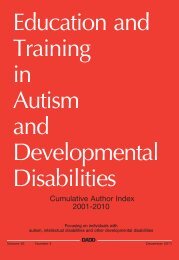Education and Training in Developmental Disabilities - Division on ...
Education and Training in Developmental Disabilities - Division on ...
Education and Training in Developmental Disabilities - Division on ...
Create successful ePaper yourself
Turn your PDF publications into a flip-book with our unique Google optimized e-Paper software.
Multiculturalism, Religi<strong>on</strong>, <str<strong>on</strong>g>and</str<strong>on</strong>g> Disability: Implicati<strong>on</strong>s for<br />
Special <str<strong>on</strong>g>Educati<strong>on</strong></str<strong>on</strong>g> Practiti<strong>on</strong>ers<br />
A. Brooke Blanks <str<strong>on</strong>g>and</str<strong>on</strong>g> J. David Smith<br />
University of North Carol<str<strong>on</strong>g>in</str<strong>on</strong>g>a at Greensboro<br />
Abstract: Religious beliefs permeate many aspects of culture. Often, however, educators are reluctant to discuss<br />
religious beliefs when work<str<strong>on</strong>g>in</str<strong>on</strong>g>g with children with developmental <str<strong>on</strong>g>and</str<strong>on</strong>g> <str<strong>on</strong>g>in</str<strong>on</strong>g>tellectual disabilities <str<strong>on</strong>g>and</str<strong>on</strong>g> their families.<br />
Ignor<str<strong>on</strong>g>in</str<strong>on</strong>g>g the salience of religious teach<str<strong>on</strong>g>in</str<strong>on</strong>g>gs about the nature <str<strong>on</strong>g>and</str<strong>on</strong>g> mean<str<strong>on</strong>g>in</str<strong>on</strong>g>g of disabilities as they relate to both<br />
<str<strong>on</strong>g>in</str<strong>on</strong>g>dividuals <str<strong>on</strong>g>and</str<strong>on</strong>g> society, however, limits the opportunity to fully underst<str<strong>on</strong>g>and</str<strong>on</strong>g> the experience of liv<str<strong>on</strong>g>in</str<strong>on</strong>g>g with<br />
disability. Discussi<strong>on</strong> of religious beliefs, traditi<strong>on</strong>s, <str<strong>on</strong>g>and</str<strong>on</strong>g> practices should be <str<strong>on</strong>g>in</str<strong>on</strong>g>corporated <str<strong>on</strong>g>in</str<strong>on</strong>g>to teacher educati<strong>on</strong>,<br />
<str<strong>on</strong>g>and</str<strong>on</strong>g> should be part of the zeitgeist of work<str<strong>on</strong>g>in</str<strong>on</strong>g>g with children <str<strong>on</strong>g>and</str<strong>on</strong>g> families. This article exam<str<strong>on</strong>g>in</str<strong>on</strong>g>es images of <str<strong>on</strong>g>and</str<strong>on</strong>g><br />
teach<str<strong>on</strong>g>in</str<strong>on</strong>g>gs about disabilities <str<strong>on</strong>g>in</str<strong>on</strong>g> three major world religi<strong>on</strong>s widely practiced <str<strong>on</strong>g>in</str<strong>on</strong>g> the United States; Judaism,<br />
Christianity, <str<strong>on</strong>g>and</str<strong>on</strong>g> Islam.<br />
Spirituality <str<strong>on</strong>g>and</str<strong>on</strong>g> religi<strong>on</strong> are important to milli<strong>on</strong>s<br />
of <str<strong>on</strong>g>in</str<strong>on</strong>g>dividuals across all cultures. Until<br />
recently, however, the spirituality of people<br />
with disabilities has been largely ignored by<br />
both communities of faith <str<strong>on</strong>g>and</str<strong>on</strong>g> secular social<br />
service <str<strong>on</strong>g>and</str<strong>on</strong>g> educati<strong>on</strong>al systems. (Avery-Wall,<br />
2006; Rogers-Dulan, 1998; Stolberg, 2008) Neglect<str<strong>on</strong>g>in</str<strong>on</strong>g>g<br />
the importance of religious belief <str<strong>on</strong>g>and</str<strong>on</strong>g><br />
experience <str<strong>on</strong>g>in</str<strong>on</strong>g> the lives of many <str<strong>on</strong>g>in</str<strong>on</strong>g>dividuals<br />
with disabilities <str<strong>on</strong>g>and</str<strong>on</strong>g> their families, may imply a<br />
view of their <str<strong>on</strong>g>in</str<strong>on</strong>g>nate humanity that is <str<strong>on</strong>g>in</str<strong>on</strong>g>complete<br />
or less complex than other people<br />
(Sw<str<strong>on</strong>g>in</str<strong>on</strong>g>t<strong>on</strong>, 1997). Spiritual beliefs may greatly<br />
<str<strong>on</strong>g>in</str<strong>on</strong>g>fluence percepti<strong>on</strong>s of people with disabilities,<br />
of themselves, others, <str<strong>on</strong>g>and</str<strong>on</strong>g> the world (Dellassoudas,<br />
2000). Multicultural educati<strong>on</strong> <str<strong>on</strong>g>and</str<strong>on</strong>g><br />
programs designed to build cultural competence<br />
must necessarily <str<strong>on</strong>g>in</str<strong>on</strong>g>clude <str<strong>on</strong>g>in</str<strong>on</strong>g>structi<strong>on</strong> <str<strong>on</strong>g>in</str<strong>on</strong>g><br />
religious practices <str<strong>on</strong>g>and</str<strong>on</strong>g> spiritual beliefs (Richards,<br />
Browne, & Forde, 2007). There is a grow<str<strong>on</strong>g>in</str<strong>on</strong>g>g<br />
body of literature <str<strong>on</strong>g>in</str<strong>on</strong>g> the help<str<strong>on</strong>g>in</str<strong>on</strong>g>g professi<strong>on</strong>s<br />
around tra<str<strong>on</strong>g>in</str<strong>on</strong>g><str<strong>on</strong>g>in</str<strong>on</strong>g>g practiti<strong>on</strong>ers to<br />
c<strong>on</strong>sider <str<strong>on</strong>g>and</str<strong>on</strong>g> underst<str<strong>on</strong>g>and</str<strong>on</strong>g> the <str<strong>on</strong>g>in</str<strong>on</strong>g>fluence of religi<strong>on</strong><br />
<strong>on</strong> people with disabilities <str<strong>on</strong>g>and</str<strong>on</strong>g> their<br />
families as part of a system of care (Benjam<str<strong>on</strong>g>in</str<strong>on</strong>g>s,<br />
2005; Forster, McColl, & Fardella, 2007;<br />
Corresp<strong>on</strong>dence c<strong>on</strong>cern<str<strong>on</strong>g>in</str<strong>on</strong>g>g this article should<br />
be addressed to Brooke Blanks, University of North<br />
Carol<str<strong>on</strong>g>in</str<strong>on</strong>g>a at Greensboro, Department of Specialized<br />
<str<strong>on</strong>g>Educati<strong>on</strong></str<strong>on</strong>g> Services, P. O. Box 26170, Greensboro,<br />
NC 27462-6170.<br />
<str<strong>on</strong>g>Educati<strong>on</strong></str<strong>on</strong>g> <str<strong>on</strong>g>and</str<strong>on</strong>g> <str<strong>on</strong>g>Tra<str<strong>on</strong>g>in</str<strong>on</strong>g><str<strong>on</strong>g>in</str<strong>on</strong>g>g</str<strong>on</strong>g> <str<strong>on</strong>g>in</str<strong>on</strong>g> <str<strong>on</strong>g>Developmental</str<strong>on</strong>g> <str<strong>on</strong>g>Disabilities</str<strong>on</strong>g>, 2009, 44(3), 295–303<br />
© <str<strong>on</strong>g>Divisi<strong>on</strong></str<strong>on</strong>g> <strong>on</strong> <str<strong>on</strong>g>Developmental</str<strong>on</strong>g> <str<strong>on</strong>g>Disabilities</str<strong>on</strong>g><br />
Hurst, 2007; Selway & Ashman, 1998). Unfortunately,<br />
special educati<strong>on</strong> has thus far largely<br />
neglected c<strong>on</strong>sider<str<strong>on</strong>g>in</str<strong>on</strong>g>g religi<strong>on</strong> as part of an<br />
evolv<str<strong>on</strong>g>in</str<strong>on</strong>g>g commitment to multicultural practice,<br />
<str<strong>on</strong>g>and</str<strong>on</strong>g> build<str<strong>on</strong>g>in</str<strong>on</strong>g>g cultural competence am<strong>on</strong>g<br />
students <str<strong>on</strong>g>in</str<strong>on</strong>g> teacher educati<strong>on</strong> programs.<br />
Religi<strong>on</strong> <str<strong>on</strong>g>in</str<strong>on</strong>g> the Modern World<br />
Only recently has science advanced to the<br />
po<str<strong>on</strong>g>in</str<strong>on</strong>g>t where humans have a reas<strong>on</strong>ably broad<br />
ability to mediate <str<strong>on</strong>g>and</str<strong>on</strong>g> manage the impact of<br />
the natural world <str<strong>on</strong>g>in</str<strong>on</strong>g> ways that are predictable<br />
<str<strong>on</strong>g>and</str<strong>on</strong>g> stable. People <str<strong>on</strong>g>in</str<strong>on</strong>g> the so-called developed<br />
world tend to believe that they have a fairly<br />
high degree of c<strong>on</strong>trol over their health, lives,<br />
<str<strong>on</strong>g>and</str<strong>on</strong>g> dest<str<strong>on</strong>g>in</str<strong>on</strong>g>y. We now know that vitam<str<strong>on</strong>g>in</str<strong>on</strong>g> A<br />
deficiency can cause bl<str<strong>on</strong>g>in</str<strong>on</strong>g>dness <str<strong>on</strong>g>and</str<strong>on</strong>g> that diet<br />
can prevent it. We know that the cognitive<br />
impact of phenylket<strong>on</strong>uria can be avoided<br />
through dietary manipulati<strong>on</strong> <str<strong>on</strong>g>and</str<strong>on</strong>g> c<strong>on</strong>trol.<br />
Technologies now allow 50 year old women to<br />
give birth to healthy babies <str<strong>on</strong>g>and</str<strong>on</strong>g> people without<br />
legs can be competitive runners (Rob<str<strong>on</strong>g>in</str<strong>on</strong>g>s<strong>on</strong>,<br />
2008). Prior to the time when the degree<br />
of c<strong>on</strong>trol that we can now exert over the<br />
natural <str<strong>on</strong>g>and</str<strong>on</strong>g> physical world was possible, people<br />
largely understood the world <strong>on</strong>ly as c<strong>on</strong>trolled<br />
by unseen, supernatural forces. Religi<strong>on</strong><br />
served to expla<str<strong>on</strong>g>in</str<strong>on</strong>g> many of the mysteries<br />
of the natural world. The power to expla<str<strong>on</strong>g>in</str<strong>on</strong>g> the<br />
unknown is also the power to c<strong>on</strong>trol behav-<br />
Multiculturalism, Religi<strong>on</strong>, <str<strong>on</strong>g>and</str<strong>on</strong>g> Disability / 295

















